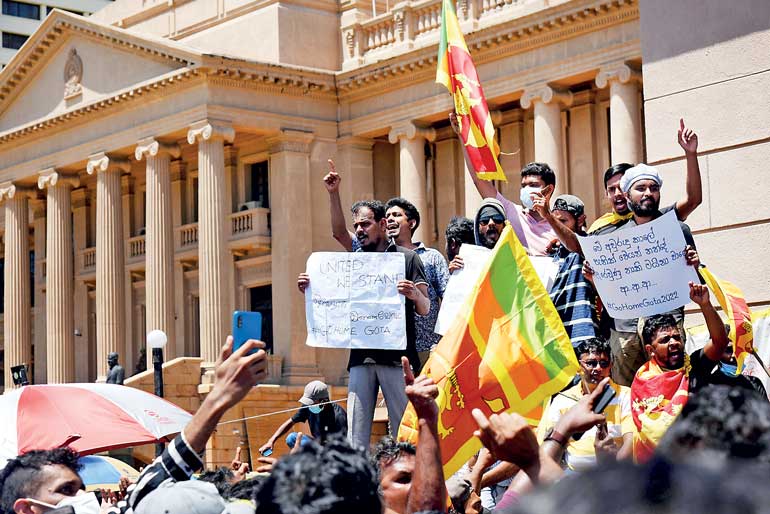Wednesday Mar 04, 2026
Wednesday Mar 04, 2026
Tuesday, 3 May 2022 00:14 - - {{hitsCtrl.values.hits}}

Neither President Gotabaya and his team B Government nor the thousands of conscious civic protestors have an idea of the system of governance that Sri Lanka needs to mainstream to rebuild the nation with resilience
A system change is a famous phrase narrated by many during the events unfolding in Sri Lanka, with the uprising of the masses following the #GoHomeGota campaign at the beginning of April 2022. The aspiration of the average Sri Lankan united as a nation is that; enough is enough; they have been denied their future by the power-hungry politicians who had taken them for a ride too long. They are all rallying to invent a better system now. 
Many Sri Lankans of different socio-ethnic and economic backgrounds voice out loudly, rallying day and night at the Galle Face Green, inspired by the comradeship of the non-political new millennials. A general strike is called by the united labour movement for 28 April 2022, an unprecedented historical event in Sri Lanka, calling for the President and Prime Minister to resign from office with immediate effect.
The digital revolution, technological advancement of the internet, and mobile communication equipment, particularly the smartphone, have empowered the individual, assembling with the power of ideas and collective flows. The stream of protesters rushing to the Go Home Gota Gama (GHGG) was motivated by the social media live updates through Facebook postings and the TikTok videos. Many youngsters complain that authorities have deliberately jammed the Wi-Fi and mobile connectivity, hindering their quick online updates with their networks. The youngsters are concerned about connectivity more than security and basic needs. These are the expectations and aspirations of millennials. We should not lose track of these trends in mobilising the socially conscious young talent in shaping the future of our nation. For them, connectivity is far superior to the sovereignty of the country.
Skilled drummers beat different drums to create rhythmic enthusiasm evoking an upbeat mood on battlefields and processions. Provided the conductor sets the right pitch and is in sync with the tune. Similarly, clever battle hardened commanders use different horses for different courses. But if one decides to use horses purely for political horse-trading, the desired outcome would be disastrous, pushing the average citizen from frying pan into fire.
The recent Cabinet reshuffle by President Gotabaya Rajapaksa correlates with the analogy given above. The President’s effort appears to hoodwink the millennials shouting on the streets with clarion calls asking him and his Government to go home. President Rajapaksa pretends that he has understood the people’s aspiration wanting system change. Accordingly, he has appointed a young cabinet of ministers: his action is an extension of the same system in a different format of dynastic politics. Proving politics in Sri Lanka has become an industry by itself.
The President intends to buy time for horse-trading to strengthen the numbers to back his Government to stabilise with a group of yes men majority in the Parliament. Another strategic miscalculation added to his numerous policy debacles, questioning his executive competencies. There is no turnaround, the public anger, despair, and suffering are brewing at a rate towards the President and the Government. It is high time that the President concedes to the general sentiment and steps down gracefully, entrusting the task to a team of intellectuals and professionals to rebuild the economy and country without further delay. Unfortunately, policymakers cannot apply consensual decision-making for the country’s sake even in an unprecedented crisis in the nation.
Masses are graduating as responsible, vigilant citizens day by day; they have overwhelmingly realised; that the healer, the physician himself, is the disease, leaving the patients in bewilderment with utter disappointment without an antidote for the cure. Enlightened citizens are now searching for the proper medication and are ready to take the bitter medicines. Hence the current crisis is constructive destruction in its complete form. All civic conscious citizens need to forge together to operationalise a survival strategy as an immediate priority to resurrect the average life of all Sri Lankans.
Enabling a culture of consensual decision-making
Never miss a crisis. Sri Lanka is in a state of constructive destruction caused by the electorate and the elected representatives. The economy has erupted with a magnitude of seismic proportions. Problems are opportunities in work clothes, as per the adage, provided that all stakeholders get together to diagnose the systemic failures and institutional incompatibilities that brought Sri Lanka to this situation. The proper diagnosis is half of the solution, provided we shift towards consensual decision-making to explore collective re-thinking. We need to mobilise all forces to build bridges and be cautiously optimistic about defeating those getting ready to dig trenches dividing the rallying people’s flows for system change.
What is the shape and form of the new system that Sri Lankans are aspiring to?
‘System change’ is the buzzword that echoes in the Galle Face to Diyawanna Gallery. Change is good for the better and not for the worst. The system changed what President Gotabaya Rajapaksa had in his heart while campaigning and uttered in words and projected on his face are entirely different from each other. A group of cunning businessmen checkmated him, and corrupt politicians sensed his hollowness. President Gotabaya Rajapaksa is probably the best imposter in the political arena in imposters’ paradise, Sri Lanka.
They all ganged up to bring him to power through a popularism driven wave for ultimate state capture. They reaped the benefits, made enough money and pushed the country and its economy into peril.
This essay aims to stimulate discussion for a meaningful social dialogue by brewing the thinking of the Sri Lankan polity to find out what should be the ‘New System’ that we are aspiring to operationalise in the country. The writer opines that neither President Gotabaya and his team B Government nor the thousands of conscious civic protestors have an idea of the system of governance that Sri Lanka needs to mainstream to rebuild the nation with resilience.
Since its independence in 1948, Ceylon continued the administrative structure put in place by the colonial administration. The British ruled the colonies with gunboat diplomacy with the agency of the British East India Company. The administration structures were established for-profit, rent-seeking for revenue generation by imposing taxes on the population to maintain the administration. The system worked well for that purpose but without a focus on nation-building. The colonial master was neither accountable to taxpayers nor the electorate as the people did not elect them.
Our founding fathers merely extended the colonial administration structure created mainly to legitimise the divide and rule policy. All these yesteryear analogue era structures are not compatible with the digital age. Public services can be provided efficiently and effectively with ICT technology cost-effectively. The new system we are creating must note all these unnecessary, avoidable expenses and cut down all parallel administrations leading to bread corruption and inefficiency.
Moreover, they are bloating the public expenditure not manageable with the volume of government revenue sources. And now is the time to prune all these wasteful expenditures and establish an efficient, cost-effective public service to the citizenry which needs to be viable and sustainable. First, we must agree on an administrative structure that serves everyone without discrimination and differentiation. All citizens are born equal and deserve equal treatment allowing them to maintain their ethnic and religious identities within the Sri Lankan nationality.
First principles of design thinking
All Sri Lankans need to think without confining their thinking to any ideologies and fixed frameworks. At this stage, we all must mobilise the intellectual and social capital to develop an innovative and creative administrative structure founded on the digital technology-based sound system that enables genuine nation-building. Henceforth, all forms of divisive discriminative practices leading to hate politics need to end. We all should cease the representative democratic power structures that fuelled the country’s ethno-religious destructive politics.
Digital technology could provide many cost-effective solutions; we can also count on Artificial Intelligence and Machine Learning technologies to find effective unbiased solutions backed with data. Operationalisation of a survival strategy is the number one priority of the proposed interim government.
First, growth policies are internalised in all economic sectors in the country. Then think of the distribution policies. Sri Lankans should create new solutions based on the First Principles of Design Thinking. We should correctly diagnose the root causes in preparation, identifying and defining the current assumptions and their limitations. Then, analyse the problems and bottlenecks by breaking issues into the core fundamental principles. Finally, create innovative solutions from scratch with the help of digital technology. A correct diagnosis is deemed to provide half of the needed solution. An ideal system that we Sri Lankans aspire to essentially needs to follow this approach.
There is also a need to move away from the outdated representative democratic models and mainstream participatory democratic models native to Asia. Now is the opportune time to revisit such practices in the dawn of the Asian 21st century. To conclude, let me quote the current policy making tool promoted by the Communist Party of China in Shanxi province.
Three fundamental questions and three explanations model
Grooming the leaders of the 21st Century Communist Party of China in Xian, in three Shaanxi cities to improve the relationship with the masses and improve the ability to serve the people better, have come up with three questions and three explanations model. The three questions the leaders are expected to address in policy formulation; are in policy direction, first consult the people, in need to ask the people, and planning to think of the people. Three explanations proposed are to solve the people’s worries, alleviate people’s frustrations, and resolve the people’s difficulties.
An excellent people-centred bottom-up guidepost framework invites and encourages all stakeholders to collaborate with participatory democratic principles in search of the New System for Sri Lanka. A better approach to inventing a survival strategy to end the average citizen’s untold hardships and support their livelihood with hope for shared prosperity. Stakeholder engagement pro-actively in policy making should be the way forward.
Instead of teaming up with the privileged few political masters and henchmen, real stakeholder engagement would be an excellent alternative in initiating the system change. The vision that empowers the next administration essentially focuses on a cleaner and a greener sustainable development path, exploring the opportunities and the resources to improve the quality of life of all Sri Lankans sharing the future prosperities.
(The writer is the Regional Director responsible for Finance Sector; Professionals and Managers Group, working with UNI Global Union Asia and Pacific Regional Organisation in Singapore. He can be contacted via [email protected].)